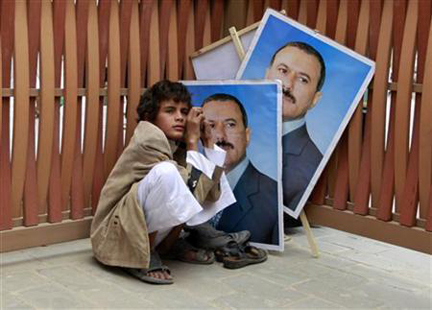
The Yemeni election was not destined to be a cliff hanger and never in doubt. With only one candidate, seemingly supported from many sides, millions of Yemeni citizens went to the polls yesterday with a blue thumbs up for the interim president-in-waiting, Abd Rabbou Mansour al-Hadi. Considering that al-Hadi has been in the innocuous position of Vice-President to the outgoing President Ali Abdullah Salih, for some 17 years, this changing of the guard is seemingly only at the palace gate. So some people might wonder why it was worth spending an estimated 48 million dollars to hold an election that was a foreordained outcome. The answer is not that democracy is served by having only one candidate to vote for, but democracy may be viable by the mere fact that Ali Abdullah Salih is no longer in charge. The vote for al-Hadi was less a vote for the consensus candidate al-Hadi than a vote to move on after the fall of Ali Abdullah. And despite the ongoing pockets of violence in several parts of the country, in effect this is the first relatively peaceful transfer of power where the leader is negotiated out of office rather than seeking asylum.
The issue is not whether Yemen is ready for democracy, as though democracy is pure only in its Western trappings, but if the various factions in Yemen can sort out their legitimate grievances without having a strong man in power for life. Before Ali Abdullah the tenure of Yemen’s military-coup leaders was cut short by assassinations. The fact that Ali Abdullah lasted for over three decades is remarkable, to say the least. While not the butcher that Asad has shown himself to be in Syria, the regime hardly had clean hands. But Yemen’s natural wealth has been squandered by corruption and incompetence, two problems that usually accompany dictatorships. The water is running out and so is the oil, so in a very real sense time is running out to resolve the political problems. The secessionists in the south and the Huthis in the north boycotted the election, but al-Hadi will have to bring them into the political framework. This is not an impossible task, but much now rests on the shoulders of a man who is not necessarily in control of the military, which itself is split.
The students and activists who spent the last year in protest tents have achieved one thing: the ouster of Salih. But the question remains of what kind of regime change the future will bring. It will probably not be the freedom they chanted for. The GCC gave Salih a sweetheart deal, immunity from obvious crimes that other leaders would be held accountable for. His loyalists are still among the players, who in theory support al-Hadi. Then there are a variety of religious parties, from the Huthis in the North and their revival of Zaidi activism to the Salafis largely supported by Saudi Arabia to Ansar al-Shar’ia and the broadened base of AQAP. Among these there is no unity and not likely to be any, so the prospect of an Islamic Republic of Yemen seems far fetched at the moment.
For the first several months the protests in Yemen were largely peaceful, certainly on the part of those protesting. Fighting between Salih’s loyalists, the breakaway army units led by General Ali Muhsin and the remnants of the al-Ahmar clan made life in Sanaa miserable. Had Salih been killed in the mosque explosion last June, and it is a kind of miracle that he survived at all, a civil war might have been triggered at that moment. But Salih has survived, although in ill health, and his acceptance of a transfer of power certainly beats a late night flight for asylum in a friendly (willing to take his money) country. Thus far, the fighting has largely been confined to the main cities of Sanaa, Taizz and Aden with the tribal militias holding their cards close to their chests. I suspect that will continue to be the case as Yemen once again returns to a civic debate, although perhaps not as vibrant as that which immediately followed the unification in 1990.
I make no predictions, but do hold out hope that Yemen will hold together from the inside. It is not Somalia, nor Afghanistan, unless foreign powers, including the United States, strive to make it that kind of failed state. Inshallah the haqq will be with al-Hadi as it was for the one who started the Zaydi dynasty in Yemen more than a millennium ago.
Daniel Martin Varisco